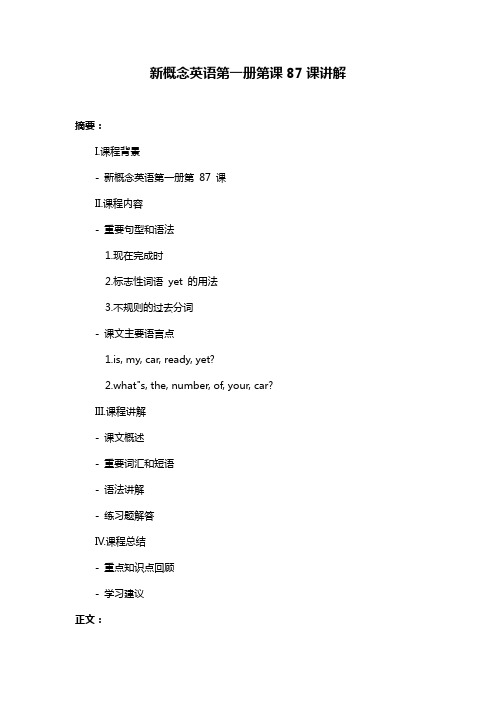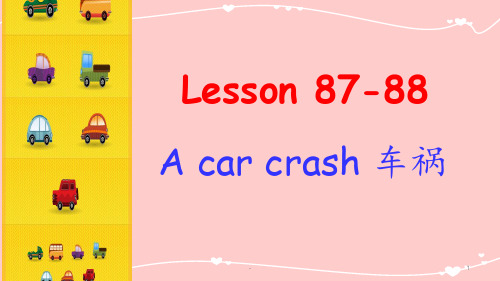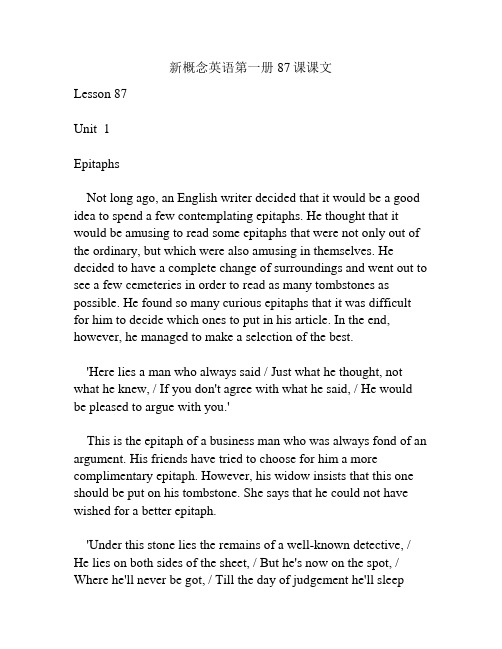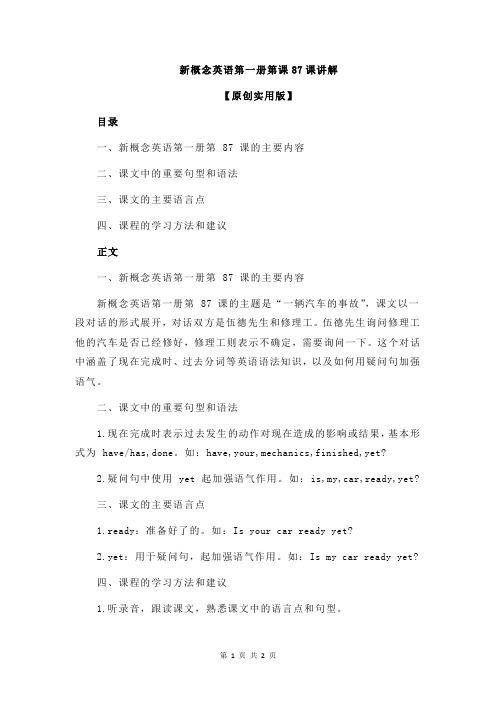新概念英语第一册第87课(31张)
新概念英语第一册第课87课讲解

第一册第87课讲解一、课文内容概述1. 课文标题:Why don't you go by train?2. 课文主要内容:该课文是一则关于旅行方式选择的对话,主要围绕着出行方式的选择进行讨论,包括火车和汽车两种不同的出行方式的利弊比较。
二、词汇解析1. train:火车2. afford:承担得起3.fortable:舒适的4. convenient:方便的5. ferry:渡船6. to wait for:等待7. harbour:港口8. journey:旅行9. save:节省三、句型分析1. Why don't you...?:为什么你不...?2. We can afford the fare.:我们买得起票。
3. It's veryfortable.:这很舒适。
4. It's very convenient.:这很方便。
5. You have to wait for hours.:你得等上好几个小时。
四、重点句子写作1. Why don't you go by train? It's very convenient.2. We can afford the fare, and it's veryfortable.3. You have to wait for hours for the ferry, and the harbour isa long way from here.4. We can save a lot of time if we go by train.五、语法分析1. This is the first time...:这是第一次...2. 本课文中涉及了现在完成时和一般现在时的运用,例如:We can afford the fare;这是现在时的肯定句。
It's veryfortable;这是现在时的描述句。
新概念英语第一册第课87课讲解

新概念英语第一册第课87课讲解摘要:I.课程背景- 新概念英语第一册第87 课II.课程内容- 重要句型和语法1.现在完成时2.标志性词语yet 的用法3.不规则的过去分词- 课文主要语言点1.is, my, car, ready, yet?2.what"s, the, number, of, your, car?III.课程讲解- 课文概述- 重要词汇和短语- 语法讲解- 练习题解答IV.课程总结- 重点知识点回顾- 学习建议正文:新概念英语第一册第87 课主要讲解了现在完成时、标志性词语yet 的用法以及不规则的过去分词等语法内容。
通过课文的学习,我们可以更好地理解和掌握这些语法知识,并将它们应用到实际交流中。
在课文中,我们学习了一些重要的句型和语法,如现在完成时、标志性词语yet 的用法以及不规则的过去分词。
这些语法内容是英语学习中的基础,对于初学者来说非常重要。
通过学习这些内容,我们可以更加准确地表达自己的观点和想法,同时也能更好地理解他人的表达。
除了语法内容外,课文还包含了一些重要的语言点,如is, my, car, ready, yet?和what"s, the, number, of, your, car?等。
这些语言点可以帮助我们更好地掌握英语的基本句型和表达方式,从而提高我们的英语水平。
在课程讲解部分,我们详细介绍了课文的概述、重要词汇和短语、语法讲解以及练习题解答。
通过这部分的学习,我们可以更加深入地理解课文内容,掌握语法知识,并提高自己的英语能力。
在课程总结部分,我们回顾了本课的重点知识点,并给出了学习建议。
这些建议可以帮助我们更好地巩固所学内容,提高英语水平。
总之,新概念英语第一册第87 课为我们提供了一个很好的学习机会,让我们能够更好地掌握英语语法知识,提高英语能力。
新概念第一册第87课

2. When did you bring it to us? (1) bring sth. to sb.给某人带来某物 (2) Bring sb. sth.给某人带来某物
➢He brings an apple to us every day. ➢He brings us an apple every day.
15
4. ★ have a look at sth.看一下 have a crash 撞车
➢Have dinner, have an apple, have a cup of tea (lesson 83-84) ➢Have a haircut, have a bath ➢Have a good time, have a holiday
16
• 5. ★ try v. 努力,设法 • Try to do sth. 努力做某事; 试图做某
事
➢They try to repair the car. ➢He tries to move the table. ➢He tries to cook a meal.
17
• 5. ★ try v. 努力,设法 • Try one’s best 尽最大的努力 • Try one’s luck 试试某人的运气 • Have a try 试试.
6
Listen to the tape and answer the question: can the mechanics repair Mr. Wood’s car?
087&088-A Car Crash.mp3
7
Attendant Bring Garage Crash Lamp-post Repair try
新概念英语单词第一册第87课:车祸

新概念英语单词第一册第87课:车祸attendant ['tend()nt] 接待员【单词扩充】desk clerk接待员 receptiorust接待员【单词搭配】A: Do we need to train the attendants?A:我们需要培训那些接待员吗?B:We'd better do it.B:还是培训一下吧。
bring [br] v带来,送来【单词搭配】bring up抚养 bring in引进 bring down降低bring out公布【单词例句】A: You'd better bring an umbrella with you.A:你带上一把伞。
B:Will it rain later?B:一会儿会下雨吗?garage ['grɑ(d); -d; g'rɑ] 车库,汽车修理厂【单词例句】A: Can I use your car this afiemoon?A:我下午能借你的车用一下吗?B: Sorry, I'll take my car to the garage to be checked.B:对不起,我得把车拿到修理厂去检查。
crash [kr] 碰撞【单词扩充】collide碰撞 bump碰撞【单词搭配】crash into闻入,撞上【单词例句】A: His son was killed in an automobile crash a few days before.A:他的儿子几天前因车祸死了。
B:He must be very sad.B:他肯定很难过。
lamppost[lmppst] 灯杆路灯柱repair [r'pe] v修理【派生词】repairman修理工【单词扩充】mend修理 fix修理【单词例句】A:Oh,my bike is broken.A:哦,我的自行车坏了。
B:Let me see.MaybeI can repair it for youB:我看看,没准我能帮你修修。
新概念一册87课

They have lived in that city for 10 years. 他们已经住在那个城市里10年了。 (强调现在依然住在那个城市。)
④She saw the film with her family last night. 她昨晚和她的家人看了这部电影。 (强调昨晚看电影这个行为) She has seen the film with her family. 她和她的家人已经看过这部电影了。 (看电影这个动作发生在过去某个时间,对现在的影 响是他们已知道这部电影的剧情了)
※bring, take
bring表示将人或物“带到(拿到)”自己(说话
者)所在的位置。 Bring it over here. 把它带来这里。 The prime minister brought a large retinue to Washington with her. 首相带了大批随从来华盛顿。
take表示将人或物“拿开(带离)”自己(说话者)
所在的位置。 Take it over here. 把它带到那里去。 The President will take several advisers with him when he goes to Moscow. 总统去莫斯科时要带走 bought a new shirt last week. 她上周买了一条新裙子。 (强调上周的某个时间发生了买裙子这个动作) She has bought a new skirt. 她已买了一条新裙子。 (强调现在已经有新裙子) They lived in that city last year. 他们去年住在那个城市里。 (住在那个城市这个动作已经结束了,他们现在不 住在那个城市里。)
v. 修理 I must repair my car. 我必须修理车子。 补偿 Nothing can repair the loss.
新概念第一册Lesson-87-88PPT课件

-
21
He takes some flo- wers to her.
19
重点2.have译为“进行,从事”时,和名词或名 词短语构成短语。 可以代替常用动词如:eat,enjoy,drink , take等
e.g.
-
20
喝酒 have a drink
度假 have a holiday 看一下 have a look 抽支烟 have a cigarette 试一下 have a try 休息一下have a break 谈一谈 have a talk
v. 努力,设法
-
7
1.attendant
n.服务员,侍者
train attendant 列车员
e.g. 我们酒店有30位接待员。
Our hotel has thirty attendants.
waiter: 男侍者
waitress: 女侍者
attend v.参加,出席
attend school 上学;读;读书;念书
I am going to have my car repaired. 2.弥补,修复,赔偿 How can I repair the mistake I have made? 我如何才能弥补我所犯的错误呢?
-
14
6. try: n./ v.设法,努力 try to do sth.努力,企图做某事。 try doing sth. 试验,试着做某事(不一定成功)
errible
-
18
重点句子1. I brought it here three days ago. 我3天前送来的。 brought: bring 的过去式 1、他为我带来了一些花。 He brings me some flowers.
裕兴新概念英语第一册第87课详解

1L871.attendant1)n.接待员,服务员eg. There are 18 attendants in our hotel.2)adj.随侍的,伴随的waiter(餐馆等的)男服务员,男侍者waitress女服务生attend v. 参加,出席eg. attend school上学attend a meeting出席会议attend a wedding参加婚礼参加并成为成员用joineg. join the party入党join us 加入我们(指与某人一道参加某种活动)join in a conversation加入一次谈话take part in参加…活动eg.Don’t you want to take part in my birthday party?难道你不想参加我的生日聚会吗?2.bring v.1)带,带着,带来eg.Don’t forget to bring your dictionary with you tommorrow.你明天不要忘记带字典来。
eg. You’d better bring enough money with you.你最好带上足够的钱。
2)bring sb/sth to将某人或某物带到某处eg. He brought some friends home(home是副词,前面不加介词).他带了几个朋友回家。
eg. She brought her little brother to my birthday party.她带她小弟弟来参加我的生日宴会eg. Don’t bring your toys to school.别把你们的玩具带到学校来。
3)bring sb sth = bring sth to sb把某物带给某人eg. Bring me today’s paper. = Bring today’s paper to me.把今天的报纸给我。
新概念英语第一册87课课文

新概念英语第一册87课课文Lesson 87Unit 1EpitaphsNot long ago, an English writer decided that it would be a good idea to spend a few contemplating epitaphs. He thought that it would be amusing to read some epitaphs that were not only out of the ordinary, but which were also amusing in themselves. He decided to have a complete change of surroundings and went out to see a few cemeteries in order to read as many tombstones as possible. He found so many curious epitaphs that it was difficult for him to decide which ones to put in his article. In the end, however, he managed to make a selection of the best.'Here lies a man who always said / Just what he thought, not what he knew, / If you don't agree with what he said, / He would be pleased to argue with you.'This is the epitaph of a business man who was always fond of an argument. His friends have tried to choose for him a more complimentary epitaph. However, his widow insists that this one should be put on his tombstone. She says that he could not have wished for a better epitaph.'Under this stone lies the remains of a well-known detective, / He lies on both sides of the sheet, / But he's now on the spot, / Where he'll never be got, / Till the day of judgement he'll sleepvery sweet.'This one was actually written by a detective himself who was noted for his sense of humour. It would seem that he had the last laugh after all. Like the business man, he also expressed a wish that this epitaph should be put on his tombstone.'Beneath this stone my wife doth lie, /Now she's at rest--and so am I!'The one time that a husband and wife wanted the same epitaph, it would seem that they both disliked each other.When the writer of the article had finally decided which epitaphs to use, he showed them to his secretary. She read them through and then asked him why he had not put any epitaphs on his own list. 'I do not intend to have an epitaph,' he replied, 'for I do not want a tombstone that says, "Here lies a writer who shared all his troubles with his secretary."'。
新概念英语第一册第课87课讲解

新概念英语第一册第课87课讲解
【原创实用版】
目录
一、新概念英语第一册第 87 课的主要内容
二、课文中的重要句型和语法
三、课文的主要语言点
四、课程的学习方法和建议
正文
一、新概念英语第一册第 87 课的主要内容
新概念英语第一册第 87 课的主题是“一辆汽车的事故”,课文以一段对话的形式展开,对话双方是伍德先生和修理工。
伍德先生询问修理工他的汽车是否已经修好,修理工则表示不确定,需要询问一下。
这个对话中涵盖了现在完成时、过去分词等英语语法知识,以及如何用疑问句加强语气。
二、课文中的重要句型和语法
1.现在完成时表示过去发生的动作对现在造成的影响或结果,基本形式为 have/has,done。
如:have,your,mechanics,finished,yet?
2.疑问句中使用 yet 起加强语气作用。
如:is,my,car,ready,yet?
三、课文的主要语言点
1.ready:准备好了的。
如:Is your car ready yet?
2.yet:用于疑问句,起加强语气作用。
如:Is my car ready yet?
四、课程的学习方法和建议
1.听录音,跟读课文,熟悉课文中的语言点和句型。
2.练习对话,加深对现在完成时和疑问句的理解和运用。
3.通过学习本课,了解如何用现在完成时表达过去发生的动作对现在造成的影响或结果,以及如何使用疑问句加强语气。
新概念第一册87课课文

新概念第一册87课课文新概念第一册是一本英语入门教材,其中第87课文以“How’s your wife?”为题,讲述两个人之间的交流。
这篇文章将会对这篇课文进行深入探讨,希望能够帮助读者更好地理解。
首先,本课文讲述的是两个人之间的交流,其中一个人问另一个人的妻子如何,这似乎很普通的一句话,但是它背后所蕴含的社交意义却非常复杂。
在不同的文化背景下,人们之间的交流方式也会不同,这便是跨文化交际学所涉及的内容。
在英语中,问候别人的家庭成员是一个非常受欢迎的谈话话题,因为它可以帮助我们更好地了解对方,并加强彼此之间的关系。
其次,本篇课文还涉及到了短语的意义。
文章中出现了“Never better”这个短语,它的意思是“从未更好”,这实际上是一种很有趣的方式回答问候。
事实上,回答问候时用“Never better”这个短语是一种比较常见的方式,它传达出了自信和福气,同时也可以让对方感觉到你的心情非常愉快。
第三,本篇文章还可以帮助读者认识到词汇的重要性。
在交流过程中,我们需要使用正确的词汇来表达自己的想法,否则就会出现误解。
例如,在课文中,问候别人的家庭成员时,我们需要使用正确的称谓,例如“wife”(妻子),“husband”(丈夫),“son”(儿子),“daughter”(女儿)等。
如果使用了错误的称呼,会导致对方产生困惑和不愉快。
最后,本篇课文还可以提醒读者注意语音和语调的重要性。
我们不仅需要使用正确的词汇,还需要注意自己的语音和语调。
因为语音和语调可以传递出我们的情感和态度。
例如,在本篇课文中,当问候别人的家庭成员时,我们需要使用温暖友好的语音和语调,以表达亲密和关爱之情。
总之,本篇文章探讨了新概念第一册87课课文中涉及到的一些要点。
我们需要认识到跨文化交际学的重要性,了解短语的使用和词汇的正确性。
同时,我们需要注意语音、语调的重要性,以便更好地传达自己的情感和态度。
这些细节看似微不足道,但它们却很重要,它们可以帮助我们更好地融入英语世界,建立更好的人际关系。
新概念英语第一册第87

新概念英语第一册第87Lesson 87 A car crash车祸Listen to the tape then answer this question.Can the mechanicsrepair Mr. Wood s car听录音,然后答复下列问题。
修理工能否修复伍德先生的汽车? Mr Wood: Is my car ready yet伍德先生:我的汽车修好了吗?Attendant: I don t know, sir. What s the licence number of your car服务员:我不知道,先生。
您的汽车牌号是多少?Mr Wood: It s LFZ 312 G.伍德先生:是 LFZ312G。
Attendant: When did you bring it to us服务员:您什么时候送来的?Mr Wood: I brought it here three days ago.伍德先生:3天前。
Attendant: Ah yes, I remember now.服务员:啊,是的,我现在记起来了。
Mr Wood: Have your mechanics finished yet伍德先生:你们的机械师修好了吗?Attendant: No, they re still working on it. Let s go into the garage and have a look at it.服务员:没有,他们还在修呢。
我们到车库去看一下吧。
Attendant: Isn t that your car服务员:这难道不是您的车吗?Mr Wood: Well, it was my car.伍德先生:唔,这曾是我的车。
Attendant: Didn t you have a crash服务员:难说您没有出车祸吗?Mr Wood: That s right.I drove it into a lamp post. Can your mechanics repair it伍德先生:是啊。
新概念英语第一册第87课(PPT31张)

• Let’s go into the garage and have a look at it. • Let祈使句 • have a look [n.] at sth • = look[v.] at sth • Isn’t that your car? • 否定疑问句,希望得到肯定答复 • 难道你不能等到下午吗? • Can’t you wait till afternoon? • 你难道不幸运吗? • Aren’t you lucky?
我刚刚吃过。(现在我不饿了)
2. 现在完成时的用法
• (2)表示从过去某一时刻开始一直持续到 现在的动作或状态。这个动作可能刚停止 ,可能仍然在进行。常带有for和since等表 示一段时间的状语。 如:He has taught here since 1981 他自1981年就在这儿教书。
I haven't seen her for four years. 我有四年没见到她了。
2. 现在完成时的用法
• (3)表示说话前发生过一次或多次的 动作,现在成为一种经验,一般译为 汉语“过”,常带有twice , ever, never
,three times 等时间状语。 eg: I have been to Beijing twice. 我去过北京两次。
3.现在完成时的时间状语
• They’re still working on it. • 这里still是现在进行时的标志词,表示
“仍然,还在”。
• work on 表示“从事,做某事”。 • 你完成作业了吗?
没有,我正在做呢
• -Have you finished your homework yet? -No, I’m still working on it.
新概念英语第一册第87课

课文讲解
• Is my car ready yet? • Is dinner ready, Carol? • yet一般是完成时的标志词(否定句或疑问 句中) • 但有时也可用于现在时,表示“已经”。 • 你还没去过香港吗 ? • Haven't you been Hong Kong yet ? • 已经在下雨了吗 ? • Is it raining ?
• • • •
Lesson88Have you---yet?
1.ASK AND ANSWER; 2. 动词原形,过去式,过去分词; 3. Exercise ;
1.Have you lost your handbag yet ?(作否定回答) 2.I met the old friend last winter.(划线部分提问) 3. The boss has already left.(划线部分提问)
• begin/start—
• be on • finish/end—
• be
• open— • be open • close— • be closed • marry— • be married • catch(a cold) • → have(a cold) • fall ill(sick,asleep) • →be ill(sick,asleep)
• • • • • • • • • •
Let’s go into the garage and have a look at it. Let祈使句 have a look [n.] at sth = look[v.] at sth Isn’t that your car? 否定疑问句,希望得到肯定答复 难道你不能等到下午吗? Can’t you wait till afternoon? 你难道不幸运吗? Aren’t you lucky?
新概念第一册87课课件

现在完成时的标志词
但有时也用于现在进
Mr. Wood: Is my car ready yet? 行时表已经
Attendant: I don’t know, sir.
What’s the number of
your car?
Mr. Wood: It’s LFZ 312 G.
the number of … ……的号码,用it’s 来回答
带来 由远及近
带走 由近及远
take
Isn’t that your car? 这难道不是您的车吗? 否定疑问句,希望得到肯定回答。
变为一般疑问句: Is that you car? 变为肯定句: That is your car. 变为否定句: That isn’t your car.
Didn’t you have a crash? 难道您没有出车祸吗?
Still 是现在进 行时标志,表 示仍然,还在
work on 表示从事,做某事
have a look= look 名词look 后加东西时,还要加介词at
Attendant: Didn’t you have a crash?
Mr. Wood: That’s right. She drove it into a lamp post(电线杆).
try on… 试穿……
Please try on this coat. 请试穿一下这件大衣。
try one's best to do sth.尽某人自己最大的努力去 事。
Let me try.让我试试。 have a try试一试
做某
be ready
yet 尚且,还;用于否 定句或疑问句中。是
做好---的准备
新概念第87课课文

新概念第87课课文Unit 87 RelationshipsMany people enjoy visiting their friends and relatives and hope to receive invitations from them. If, however, they are asked to go and see someone they do not know very well, the situation is different. Some people may feel uneasy about accepting such an invitation and try to think of an excuse to avoid doing so. They feel that visiting someone is a very personal matter and that they must be fairly close to the person involved. They may also feel that they would be in the way if they accepted the invitation and visited someone they do not know well or see very often. As a result, they may decide to decline the invitation when they really need not have done so.In some countries, the situation is different. People do not wait to receive invitations before paying a visit. They feel that seeing someone socially is quite a normal thing to do. Only close friends wait for an invitation. However, in other countries, the opposite state of affairs exists. An invitation is absolutely necessary unless people know each other intimately. In general, the English are rather formal. When someone invites them to their home, they feel that they must wait for a second invitation before making a return. Otherwise, they may not be asked to go again. Consequently, relations between people from different countries are often strained.。
